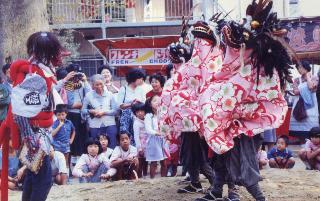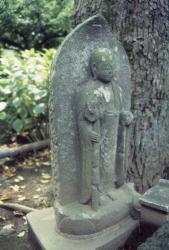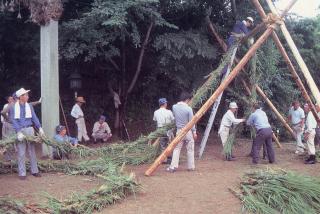Last updated: March 16, 2018
The folklore exhibition room displays materials such as Inagi City's annual events, folk implements, local performing arts, stonework, and fishing equipment.
| Exhibition theme | overview | Exhibition Contents | |
|---|---|---|---|
| 1 | Village life and annual events | Annual event | Annual events held at the farm and folk implements throughout the year |
| 2 | Private house and life | villages and private houses | Models of old folk houses, topographical models of the Sakahama area, etc. |
| 3 | Folk tools in daily life | Folk utensils for food, clothing, and shelter | Folk utensils used in daily life for food, clothing, and shelter |
| 4 | Folk tools used in farming | agricultural tools | Agricultural tools used for rice cultivation, field cultivation, and mountain work |
| 5 | Growing pears in Inagi | Making pears | The history of pear making in Inagi and the folk tools used |
| 6 | Edo no Sato Kagura and local performing arts | Local performing arts | Edo's Sato Kagura, Shishimai, Hayashi, Gagaku, etc. |
| 7 | Stonework and popular beliefs | stonework | Jizo Bodhisattva Tower, Koshin Tower, Bato Kannon Tower, etc. |
| 8 | Events and beliefs from snakes | Events from snakes | Snake events and beliefs held at Hyakumura Myokenson |
| 9 | Living with the Tama River | Tama River | Tama River fishing, ferry terminals, types of riverboats, riverboat construction, etc. |
Folklore exhibition room
In the Inagi city area, life has been centered around agriculture since ancient times. Private houses were built and villages were created taking into account geographical conditions such as hills and flat areas. On display are models of old folk houses from the Edo period in the Sakahama area, as well as models of storehouses and woodsheds. Also on display are topographical models created by researching the old place names and villages in the Sakahama area.
Models of old folk houses, storehouses, and woodsheds from the Edo period
Topographical model of the Sakahama area
We exhibit the folk tools used in daily life for food, clothing, shelter, and farming. These are tools that have been used in daily life centered around farming, including agricultural clothing, footwear, cooking tools, farming tools, sericulture tools, and pear growing tools. In particular, various tools for making pears, a specialty of Inagi, are on display.
Food, clothing, shelter and farm tools
Folk tools for making pears
Edo no Sato Kagura is said to have originated in the early Muromachi period, and has been designated as a national important intangible folk cultural property. The tools, costumes, and masks used in kagura are on display, as well as life-sized statues of kagura gods. In addition, we introduce local performing arts such as lion dance, hayashi, gagaku, taiko drums, and matoikiyari.
Edo no Sato Kagura exhibition

Seii Shrine Lion Dance
Various stone structures built after the Edo period are scattered along old roads and within the grounds of shrines and temples in the city. Representative stone structures include Jizo Bodhisattva Towers, Koshin Towers, and Bato Kannon Towers, and are displayed with full-sized models. The museum also introduces the beliefs of the common people in the areas where these stone structures were built.
Life-size model of stonework

Jizo Bodhisattva Pagoda at Jōrakuji Temple
The Hebi Yori Event (Gyoji) is a folk event held at Myokenson in Hyakumura every year on August 7th, and has been designated as an intangible folk cultural property by the Tokyo Metropolitan Government. Twisting Aokaya leaves together to form a giant snake, people pray for warding off evil spirits for the year. A life-sized model of a giant snake's head and photos of the day's events are on display.

Snakes and the event
big snake head model
The Tama River around Inagi has seen a variety of ways of life connected to the river since ancient times. Their lives included river fishing, including sweetfish fishing, the three ferry terminals located in the city limits, and building river boats on the Tama River. Here, various types of fishing gear used in river fishing, models of riverboats such as houseboats, and riverboat construction tools are on display.
Fishing gear used in the Tama River
Tama River ferry and houseboat (model)
Inagi City Education Department Lifelong Learning Division Tel: 042-377-2121